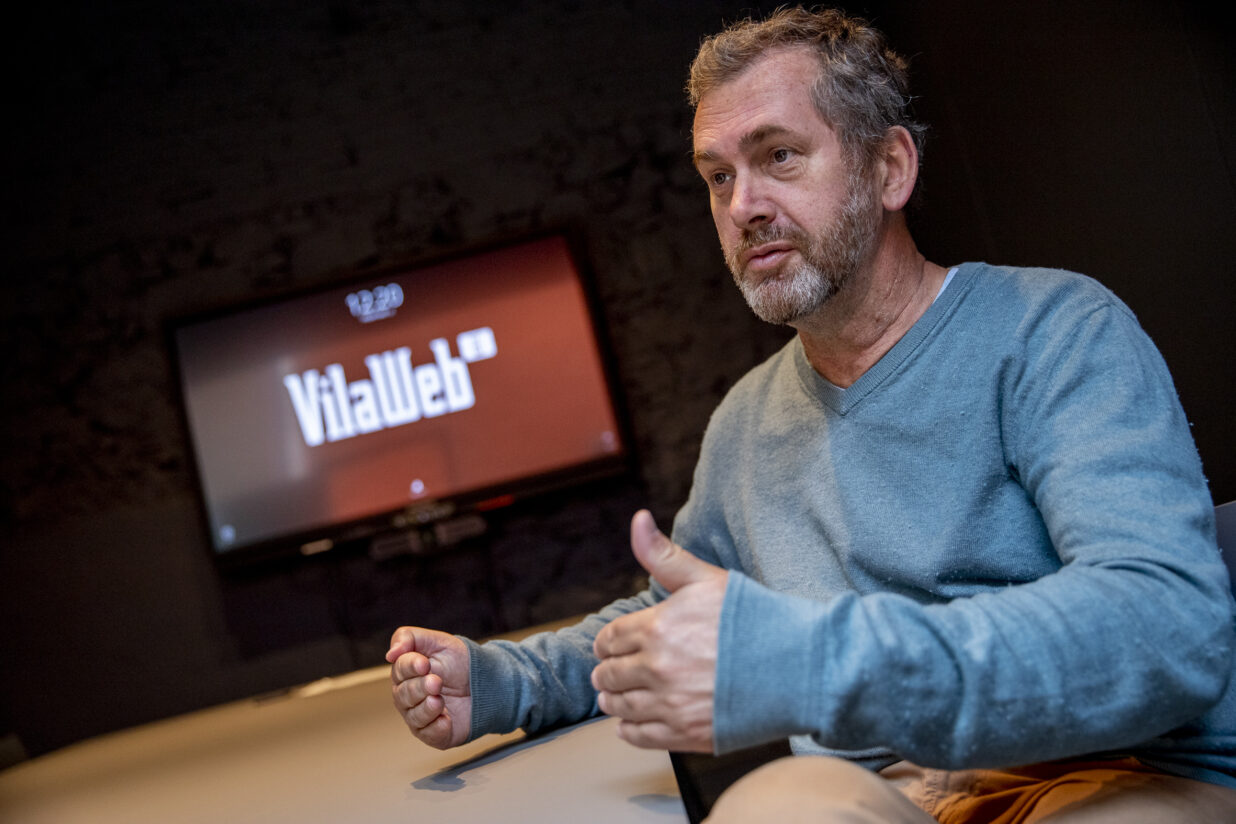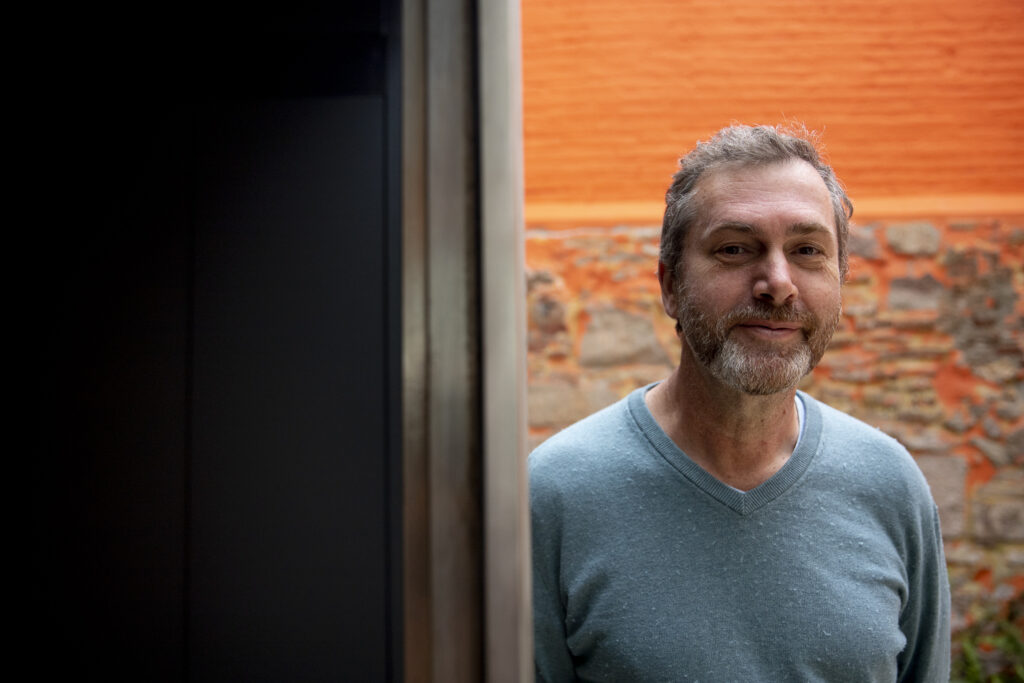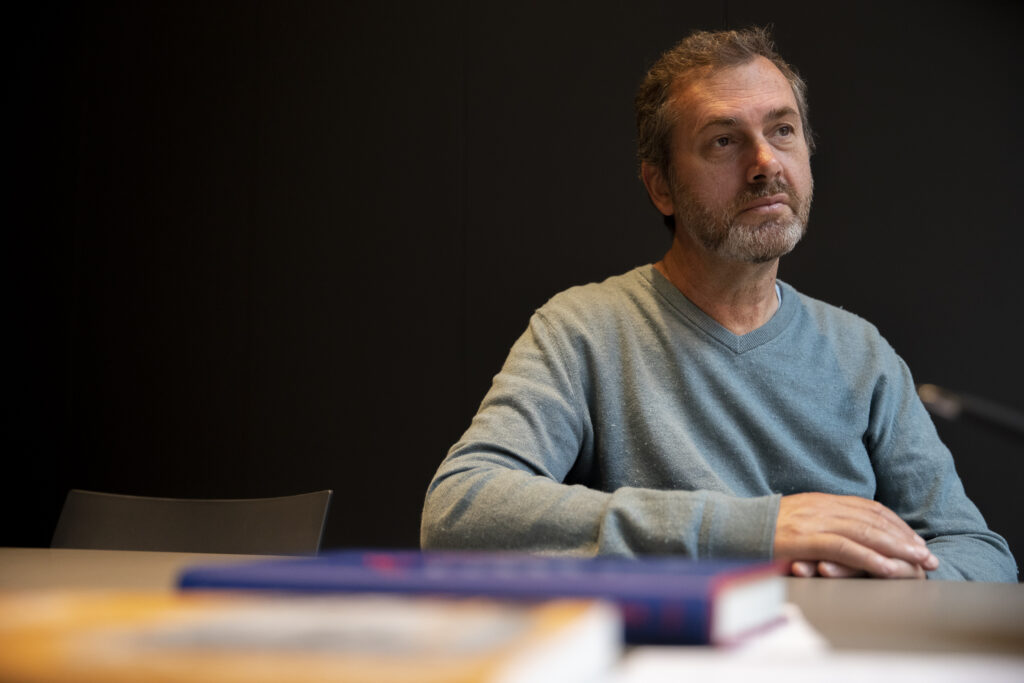14.05.2023 - 15:25
|
Actualització: 15.05.2023 - 02:02
[Llegiu l’entrevista en català ací]
Timothy W. Waters is the author of Boxing Pandora, one of the most interesting and brilliant books on how relations between states are established, the processes of independence and the drawing of borders. His main idea is that the problem is not with the declaration of independence, but with forcing someone to stay in a state in which he or she does not want to be. That’s why he defends a way of negotiating independence that avoids the only way to be independent being to use violence.
Waters, Associate Director of the Center for Constitutional Democracy at Indiana University has been in Barcelona this Friday for a debate on self-determination with Catalan MEP Clara Ponsatí.
-How does an American suddenly think about borders?
-I grew up in Los Angeles. So for me, the border was an ocean. I lived on the edge of a gigantic city, so large that as a child I assumed it never ended. I thought, well, let’s just go all the way to New York. But in the other direction it just stopped immediately. The border of my country or of the city was a beach and beyond that it was just completely empty. I think that’s the first sort of border in my mind.
-But what about borders in the political sense of the word?
-I spent time studying in Europe. Afterwards, I joined the US Peace Corps and was sent to Hungary. That was at the time when the war broke out in Yugoslavia right next door. Right after the Peace Corps, I went to graduate school and law school. That’s when I really started focusing on that region. Because of that, I think I got interested in borders.
-There was no war in Ukraine at the time of the writing of Boxing Pandora…
-That’s correct.
-A war that, in a way, gives you the reason. On the subject of Crimea, most of us would agree that if a democratic referendum could take place in Crimea, then Crimea would probably want to be part of Russia. But we cannot accept a referendum with tanks in the streets. And at the end of the day this situation leads to a war, which is the worst possible scenario today. So to what extent does the war in Ukraine make you think that it’s better to prevent this kind of situation?
-I think people often draw the wrong conclusion about such events. They look at the war in Ukraine, for example, they see that it’s about territory in important ways, which is true. And from that, they conclude, oh! you see, we should not ever think about changing borders. Look how dangerous it is. But I think your question suggests the more accurate understanding, which is it’s precisely because of things like the war in Ukraine that we should be thinking about borders and how they might change in peacetime. Because it’s probably true that the majority of people in Crimea prior to these events and prior to 2014, were sufficiently alienated from the government in Kiev, that they might well have preferred to join Russia. Again, now it gets difficult to say it because in wartime, people’s emotions are very high. But it’s probably true.
-And?
-And yet we had no process in international law and relations to think about such a change. We’re actually really resistant to it. And having no process means that the only other way that change is going to happen is through some violent, illiberal and completely unacceptable means. That’s in no way to justify it. I would prefer that Crimea stay part of Ukraine than be violently removed through warfare. But those aren’t the only two choices.
-What other options exist?
-The motivation for me to write the book is to think about ways in which we might imagine in politics and law, changes to borders that are responsive to people’s desires, precisely so that we don’t have to either do nothing or accept the change coming through warfare. But as I say, this is a lesson people constantly misunderstand. And they think that the question is about accepting violent change. And it’s quite the opposite. It’s about finding other pathways besides violence that could allow us to accept change.
-Do you think that a war like the one in Ukraine can help to understand that it is better to find acceptable solutions to change the borders in a democratic way than to let situations fester?
-It’s certainly possible. Any great violent transformation shakes things up and makes people rethink them. So it’s possible. If I’m on days when I’m hopeful, I think, yes, maybe that’s going to happen. I might think when this war ends in some way, perhaps there’ll be marginally more space for it. And the hopeful part comes from places like Catalonia or Scotland or Quebec, where some people realize that maybe we shouldn’t reflexively resist any change, but at least ask what kind of state might follow. And that’s one of the things I talk about in the book is that there’s been a longstanding assumption that borders changes produce illiberal states. We can almost test and show is just isn’t true. Sometimes it makes a less liberal society, but sometimes a more liberal. And we should presumably make our valuations and our political choices based on what we think will be the outcome and not sort of an iron rule that we always resist this.
-One of the things you say in the book is that very often the violence breaks out not on the side of the secessionists, but on the side of the state, and that the states create this violent reaction against the movement. Catalonia is an obvious example.
-Yeah. On a global scale, Spanish reaction it’s state violence of a relatively limited type. I don’t mean to minimize it, but of course, it’s not the kind of violent suppression that we see in other places. But it’s an example of the range of possibilities that the existing state has material resources and equally importantly, the legal position to do this. So the response is coercive and based on state power. What was fascinating to me in the Catalan casa is that there was some visible amount of discomfort in other European countries with that response. Although the sort of default institutional response was that this is an internal matter that has nothing to do with the EU, the level of police response, including violence, made a lot of people very uncomfortable. We don’t want to pursue claims about borders through such means, right? That’s why it’d be better to think about creating peaceful pathways for electoral decisions, because you don’t want to tell any group that your best strategy for achieving a legitimate political desire is to provoke violence. I think realistically, that’s true, but it’s a terrible model. And we don’t want to encourage that anywhere. The costs are far too high.
-This discomfort with violence is making relevant people all over the world think that we have to do something because the old way is not working. State violence creates far more problems than it solves. And that is the central thesis of your book.
-I’ve often relied on the international relations scholar, E. H. Carr, as a thinker. He’s one of the founders of international relations, but the book that he’s most known for spends a lot of time talking about judicial processes in courts. He was criticizing the interwar period and the attempt to rely on international adjudication and arbitration and courts as a replacement for politics. So he’s often thought of as sort of a hardcore realist, but his underlying thesis is actually much more nuanced and is pointing us to the idea that we need to think about pathways of peaceful change in law and politics precisely because if we don’t, then eventually people resort to violence. Human societies will look for change to respond to their needs and the art of politics is to find pathways to channel that that are peaceful and not to expect that the alternative to no peaceful change is no change at all. That’s when your alternative is violence and this returns to the theme you mentioned before. It’s true that lots of secessionist movements involve violence and sometimes they’re the originators of the violence, but in those cases where we see pathways for the possibility of border changes or changes to a state that are peaceful, we don’t see violence. Why would you resort to that as a first choice unless you saw no other options? So that’s why the Spanish case is a great one because we see a movement, whether one agrees with it or not, that was entirely peaceful. And the response is quite harsh.
-The thesis of your book is that the right to self-determination has been perverted over the years. States have changed what it used to mean. So you argue for the right to secede without all the paraphernalia of being an ancient kingdom or speaking a particular language. You just talk about democracy. You have a group of people who want to succeed. Let’s deal with it.
-That was the sort of key problem I set for myself in writing the book. How could we make a claim for changing the borders of a state that didn’t rely on some pre-existing fact, which is what most people do. So lots of political philosophers want to look at questions of whether there’s a legitimate grievance or a pre-existing title to the territory and these are perfectly plausible ways to approach the question. For me the problem is they’re not responsive to new circumstances and they’re just very contested. The real question comes down to whether human beings living today care about those historical claims or not. Or justice is the most obvious example that we often think about the reason that we might change borders is to respond to some historical injustice. But nobody can agree on this.
-Not in our world…
-We can think about any number of cases, you know, Israel-Palestine, where groups cannot agree on a definition of justice. And for me that’s why I was looking for some model that didn’t rely on claims about history or justice that are contestable and irreducible. And the model I have, it looks very thin and procedural but it’s really based on the idea of elections. If you can get human beings to agree upon a claim today and express it through what in Canada is called a clear majority on a clear question, then that should be a plausible basis for negotiating changes in borders in the same way that we understand that process as the basis for changes in government.
-Election is the main issue?
-We do elections all the time. We know how to do that. And it seems like the most plausible model for change in borders as well. But it means stepping away from all the claims about what happened in the past or anything other than “do a majority of people today in this space desire this?” And I just said space. This is the other tricky question. What I was looking for, was a model that didn’t rely on existing units either. Because those units are often themselves functions of attempts by states to control demography. So what’s interesting in the Catalan case for me is the independence movement is based on the existing unit inside Spain, not on areas where either Catalan speakers or people sympathetic to Catalan independence necessarily live. My model actually is somewhat different and it would probably end up with a result that says some parts of the existing territory of Catalonia might not want to depart and the claim would be weaker for those areas. But there might be parts of the neighboring territories where people are sympathetic that would want to join that. So my model is more flexible in terms of identifying the physical territory that might be separated from a state. But always based on some measurable estimate of the desires of the people who live there through a plebiscite.
-There is one example that has already been a success. It is Swiss Jura.
-Switzerland always is both an example and an exception. So it’s never sure we can copy it elsewhere. But what’s fascinating about that case is that it solves a number of problems. In the case of the Jura we know that the borders that are arrived at, they’re not expressly decided based on language. They’re decided on a series of plebiscites that sort of refine the border. And it tracks with language only in the sense that people unsurprisingly made choices about which side of a unit they wanted to belong to based on language. But it’s not the language that’s deciding it. It’s people’s choices. So it’s a great model and it produces a border that’s much more nuanced and precise in many ways without imposing it on people. And that’s something I try to draw on in my model is the idea of having multiple cascading plebiscites that can sort of serve to more precisely identify a border between groups based on people’s desires expressed in an election or a referendum, rather than some outside actor like Woodrow Wilson looking at a map and saying, where people of one group live.
– The problem with your theory is that it allows perpetual movement. Catalonia is like this today, but tomorrow it would be different. And in 20 years it will be different. And you have to recognise that. That means you’ve got to keep negotiating forever…
-I think that’s right. And that sounds sort of destabilizing, but I’m not sure that it necessarily would be. One can imagine pausing it. You could build in structures where the question could only be raised every 20 years, once a generation, as the British model has suggested. But another way to think of it is that it might not be nearly as destabilizing as we sometimes fear to accept that this is a permanent possibility. In fact, this is something that one can sort of at least implicitly draw from the Quebec case. It’s precisely the fact that Quebecois nationalists were given a recognized option of exiting in effective terms that helped to lower the temperature.
-So making it easier to leave can be advantageous for the state?
-Part of the problem in our current model is that there is no exit. And yet there are places where people are dissatisfied. And that means the temperature is really high. Well, if you allow people to change and they know it’s possible, then that lowers that political temperature in a permanent way. So it’s true, an independent Catalonia might find 20 years later that its borders will be adjusted yet again because some areas would say we are not happy with this and we want to return to Spain or something like that. Well, that should be possible. And if that happened, it’s not necessarily a disaster. I would hope an independent Catalonia, having benefited from a right of exiting Spain, would not suddenly decide that no one may leave Catalonia either.
-That used to be discussed in Scotland…
-This is a common problem, of course. I remember during the Scottish referendum, in the same moment that the Scottish Nationalist Party was calling for independence from Britain, some of its leaders were loudly proclaiming that they would never let the the Shetland Islands depart from Scotland. And this is a challenge to my model, I think, is how do you make sure that people who are claiming a right are also willing to give it to others. People are not famously generous that way.
-What are you working on now?
-My next book might be thinking about completely stateless or territorialist nationalities. And it’s drawing on a concept from Roman law, which had a very sophisticated system for dealing with the identity of people and their legal reaction or interactions as they moved around the empire, because people had “national” identities that determined their legal status, and then you had to think about how those interacted within the imperial system. There’s a whole separate legal category for them. So it’s a fascinating example of what looks very postmodern in a way, of imagining communities that might have political status and relationships without any connection to territory.
-How does it work?
-There was an understanding that each city or region had a legal system of its own, with rules for commercial transactions, family law, things like that. You would get married and transact business and all these things according to a set of norms that were recognized. But those weren’t purely territorial, they were attached to your identity. So let’s say you were Jewish, right? You would get married and transact business, apply the criminal law according to the Jewish codes. And that was true even if you were in Rome or somewhere else. So two Jews having a commercial relationship in what is now Barcelona would follow the Jewish legal codes. But then what about if a Jew and a Roman are interacting or a Jew and a Greek? Well, then you need a separate legal system to govern them. And so there’s a development of an imperial sort of cross-community legal structure governed by one of the praetors in Rome. So for hearing special cases of what we would call in America diversity jurisdiction, different communities have to interact. It’s like modern private international law where we have to think about which legal system to apply. We still have places like Israel or India where family law is governed by religious rules and you have to know what group you belong to anywhere on the territory. But the Roman system also covered criminal law, commercial law, a much thicker set of relationships than anywhere in the world today. And conceptually we could still do this. We could say you are a Catalan and that’s the legal system that you’re going to carry with you all around the world…
-Even if you live, let’s say, in Poland?
-Yeah, so two Catalans in Poland will be subject to Catalan law. But then you need special rules for what happens if you deal with a Polish person. So it inevitably has to deal with territoriality as well. But it’s a fascinating system. I was interested in studying it in law school and often thought about coming back to what would it look like to imagine a world of truly non-territorial status-based communities. And I have to say that one reason I haven’t written this book yet is I think the answer is it would really be dysfunctional. It would not work well.
-Perhaps something similar is happening at the level of the European Union.
-I’m no expert on European law, but what I see happening is the creation of a new uniform space. So it’s certainly novel and it’s definitely different from a national state model. But I don’t think it is similar to what we see from the old Roman model, in that it’s not about transporting diverse differences around, but rather creating a shared common legal and political and social space that we would call Europe. Which happens to have sort of these federalized different spaces within them. The European Union is an enormously interesting innovation and one that if it fully succeeds in its project, will produce something that looks far less innovative because its long-term trajectory, I think, of its originators is a kind of state. Now, one with a great deal of diversity inside it, but it will be state-like. I often hear European lawyers talk about the abandonment of borders. And I have to say it sounds sort of parochial because what they’re talking about is the abandonment of borders inside Europe. The Schengen border is one of the highest and firmest in the world.
-You always seem to be thinking on the edge. Are you tired of being in this position? Or is it exciting?
-I think it’s more exciting than tiring. Maybe it’s a little abstract sometimes, I fear. It’s not about the present day detail. It’s a long-term argument, obviously. I can’t imagine working on a book like Boxing Pandora if I actually wanted to see something happen in the immediate present, because it’s unlikely to be true that such changes won’t happen. So it’s an argument I tried to work out because to me it made sense. But I think that’s a long-term project, yes.
-The last question concerns tonight’s event. You’ll be sitting with a European parliamentarian who, legally speaking, could be arrested while you speak. How do you feel about this?
-As I understand, there’s not a great risk of that. But legally speaking, that’s the situation, which is absolutely curious. It is odd. I’m not sure what to say about that. I was glad for the invitation. I had met Clara Ponsatí back in Brussels while she was still in her exile shortly before this turn of events. I think in fact, that’s where at the event I was in Brussels in January, where she announced that she was going to be coming back for the first time in what, three or four years, I think?
-Five already.
-Five! Goodness, that long. Okay. So it struck me as a good turn of events It seems to me that it’s a good result that, if not the Spanish state, then at least European institutions have acknowledged that whether or not there’s a right to decide on independence, that states and their institutions shouldn’t respond with sort of the maximum tools of state coercion, at least leaving the space open. That I think is a positive thing. So her return in that sense is well, it’s a small but good sign of a more civil discourse. And even though technically, under the Spanish system, it’s still a question of illegality, at least the Spanish system is responding to a European level of decision that keeps it in a kind of a more open dialogue. That is a positive step.





